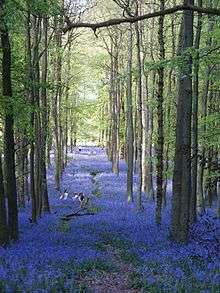Whittlewood Forest
Whittlewood Forest is a former medieval hunting forest in the south of the county of Northamptonshire in England. There are tracts of ancient woodland within the forest, and old ditch boundaries can be found at the edges of several of the individual woods. The area has been the subject of extensive academic historical research.[1]

Extent
The core of the forest is between the villages of Silverstone, Syresham, Abthorpe, Wicken and Potterspury extending south to the Northamptonshire-Buckinghamshire county boundary. Interconnecting woods, made up in part by Hazelborough Wood, make up the main section. Isolated woods such as Bucknell Wood and a scattered collection east of the village of Whittlebury, stretching east to Potterspury make up the majority of the rest. Remnants exist all around the villages and over the county boundary into Buckinghamshire and Milton Keynes. Outliers include Whistley wood to the west of Syresham.
Management
It is managed by the Forestry Commission, who also manage neighbouring woods such as Salcey Forest and Yardley Chase. Parts of the wood are protected as an SSSI, especially a number of separate copses which represent the remnants of the old Royal Forest. .
Ecology
It is notable for bluebells in mid-Spring in many parts of the forest together with other ancient woodland indicator species such as Yellow rattle and the Lesser celandine. There are stands of beech and oak interspersed with hazel coppice as well as conifer plantations within the forest. The conifer plantations are slowly being removed as a part of a national policy to restore ancient woodland. They will be replaced with native hardwoods such as oak and beech. As with most ancient woods, coppicing is no longer practised, and many former coppice stools can be seen in the woods.
Many types of deer can be found in the forest, including red deer and roe deer as well as Muntjac deer. Foxes and badgers are common. Birds include buzzards and there are occasional sightings of the Red kite, possibly from the expanding population in the Chilterns.

See also
References
External links
- Natural England for SSSI designation
- Forestry Commission website
- Map sources for Whittlewood Forest
Coordinates: 52°04′18″N 0°57′03″W / 52.07170°N 0.95096°W
